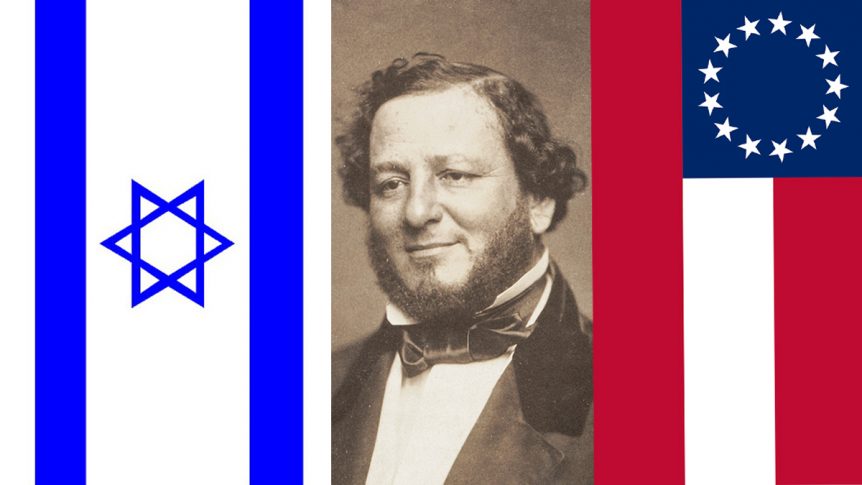Please Share This Article on Social Media 😐
The Jewish second-in-command of the Southern Confederacy during the Civil War was once a United States senator.
August 2020
Judah Philip Benjamin was born August 6, 1811 on the island of St. Croix in the Danish West Indies (the present-day Virgin Islands) to Jewish parents. At the time of his birth, Benjamin’s family was in transit from England to America. However, due to the War of 1812, the family was forced to settle in the West Indies until the war ended. They finally arrived in America in 1814, settling in Charleston, South Carolina.
Judah Philip Benjamin was Jewish and before he could even be seated as a senator, Benjamin was also offered a seat on the Supreme Court by outgoing President Fillmore. Benjamin declined and was sworn into the Senate on March 4, 1853, becoming the second Jewish senator (after David Levy Yulee of Florida, in 1845).
Entering the Southern Slaveholding Aristocracy
Benjamin was an exemplary student. At the age of 14, he entered Yale University. Two years later he was expelled (no record exists as to the reason) and eventually, Benjamin moved to New Orleans.
Benjamin apprenticed at a law firm and began to study for the bar–a complicated course of action because, to become a lawyer in Louisiana, the state’s use of the Napoleonic Code required fluency in both English and French. In order to fulfill this requirement, Benjamin took a job teaching English to the daughter of a prominent Creole family, Natalie St. Martin, so that he could learn French.
The tutoring sessions worked well and provided unintended benefits–on February 12, 1833, the 21-year-old Benjamin and the 16-year-old Natalie were married. As a condition of marriage, Benjamin agreed that the couple’s children would be raised in the Catholic faith. That same year, Benjamin was admitted into the Louisiana bar.
“An Egyptian in Israelite Clothing”
In 1842 Benjamin was elected, as part of the Whig political party, to the lower house of the Louisiana legislature. Ten years later, he sold his plantation and all of his slaves. That same year, the Louisiana legislature selected him for the United States Senate.
Judah P. Benjamin
Jewish Confederate
Before he could even be seated as a senator, Benjamin was also offered a seat on the Supreme Court by outgoing President Fillmore. Benjamin declined and was sworn into the Senate on March 4, 1853, becoming the second Jewish senator (after David Levy Yulee of Florida, in 1845).
Benjamin was offered an appointment to the Supreme Court once more, in 1854, by President Tyler. Again, Benjamin declined. In the Senate, Benjamin gained a reputation as a skilled tactician and orator, yet his Jewish background and service for the slave-holding South provided points for attack. An abolitionist senator referred to him as “an Egyptian in Israelite clothing.”
Jefferson Davis’ Right-Hand Man
In March of 1861, Benjamin was appointed Attorney General by Confederate President Jefferson Davis, with whom Benjamin had served in the Senate. Davis often referred to Benjamin as “the brains of the Confederacy.” His appointment made Benjamin the first Jew to ever serve in an American cabinet. That same year, Davis requested that he accept the position of Secretary of War.
After public outcry over Confederate failings on the battlefield, in particular when reinforcements never arrived at the battle of Roanoke Island, Benjamin resigned as Secretary of War and was promptly appointed Secretary of State. Benjamin served in that position for the remainder of the war, often working at Davis’ side for up to 12 hours a day.
On February 9, 1865, two months before the Confederate armies surrendered, Benjamin gave the most controversial speech of his political career, an impassioned plea for the Confederacy to arm their slaves and enlist them as Confederate soldiers. In Richmond, before an audience of 10,000, Benjamin asserted: “Let us say to every Negro who wishes to go into the ranks on condition of being made free–‘Go and fight; you are free.’ If we impress them, they will go against us. We know that everyone who could fight for his freedom has had no chance.” READ MORE
Judah Philip Benjamin’s bio sheds light on Jewish involvement in the slave trade and participation in the Civil War. Enough said.![]()
Suggest a topic or issue to InnerKwest℠. We will post your suggestion on our projects board que. Should a writer tag your suggestion for review, you may see the respective narrative published at the appropriate time as determined by the editor. Leave your suggestion at the comments section below.
Spread the word about InnerKwest℠.
Thank you for your interest!
InnerKwest™ will continually and conscientiously resonate a message of unity. We will not relent, digress, or vary from that message to any degree. Please sign-in below to leave questions or comments.
We always welcome constructive contributions and commentary.![]()
The writers and publisher of InnerKwest™, AMIBC™, and AMIBCNEWS™ strive to provide professional, positive, yet provocative narratives and opinions for edified consideration. Make sure to join the AMIBC Founders Club to maximize the total advantage of being a subscriber.
Please consider supporting the advertisers on InnerKwest. Presently we do not place Google Ads on our site. We are setup to do so, but we would prefer to allocate space to our subject matter. The narratives and issues impacting African-Americans and the culture is tantamount to the this platform. Every contribution, however big or small, is valuable to securing our future. Also visit and join the AMIBC Founders Club to maximize the total advantage of being a subscriber. Contribute by clicking on the advertisers featured on AMIBC site and utilize them.
RedaJames Inc All Rights Reserved MMXXI
InnerKwest ™ ® & © 2004 – 2022
Powered By geekPut










